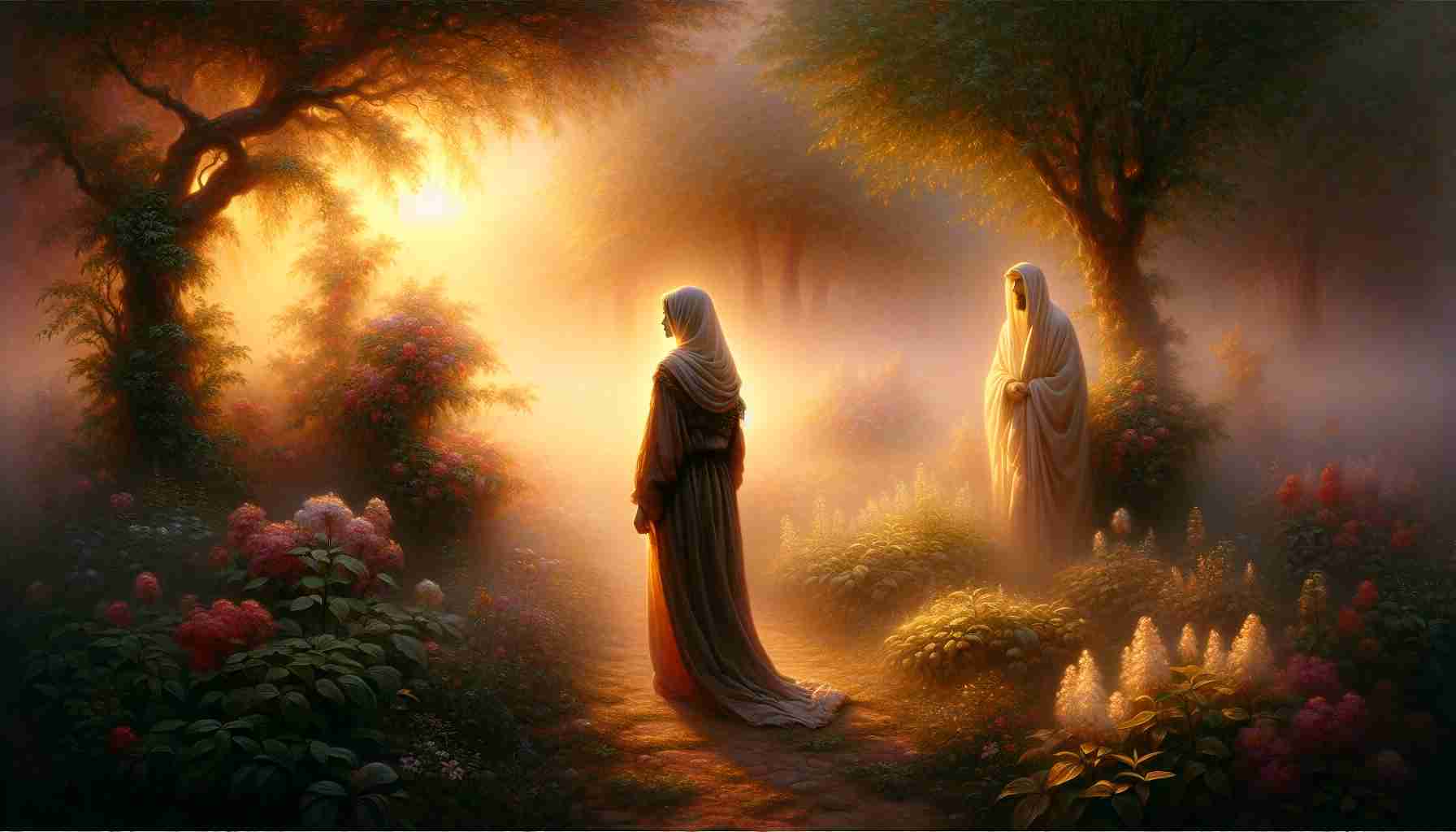

The morning air clung to Mary’s skin, cold and still. Jerusalem had barely begun to stir, but the garden outside the tomb was already stirring with memories that refused to sleep. Just two days before, she had watched Him—her teacher, the only man who ever saw her, truly saw her—bleed beneath a Roman whip. The temple elite had looked on with smug satisfaction, as if they’d finally silenced a rebel. But Mary had stood with the others, silent, defiant, broken.
Now she stood at His tomb, heart raw, eyes swollen. The stone had been rolled away. The burial spices she clutched were of no use now; He was gone. Not just dead—gone.
Tears blurred her vision as she stepped closer, peering into the hollow place. Two figures in white sat where His body should’ve been. She barely registered them as real until they spoke.
“Woman, why are you crying?”
“Because they’ve taken my Lord,” she choked out. “And I don’t know where they laid Him.”
Their silence unsettled her. Turning around, she noticed a man standing nearby. He hadn’t been there before—she was sure. He stood among the trees, still, as if the garden belonged to him.
“Sir,” she said, swallowing her sobs, “if you've carried Him away, tell me where you put Him, and I will go get Him.”
The man said one word. “Mary.”
That was all.
Something in the way He spoke her name unraveled her grief in an instant. She fell to her knees with a gasp, her fingers trembling as they reached instinctively toward Him.
“Rabboni,” she breathed—a term of tenderness, of reverence. Not just ‘Teacher.’ My teacher.
The world tilted in that moment. Not in chaos, but clarity. The despair, the weight of death she’d carried these past days—it lifted like mist under sunlight. He was not gone. He was not defeated.
“I must return to the Father,” He said gently, stepping back. “But go. Tell the others.”
Mary felt the sting of parting, but peace settled deeper than sorrow. She had come to anoint a dead man. Instead, she had encountered life.
As she returned through the quiet garden path, the morning sun finally peeked over the eastern walls. The spices still hung from her hands, untouched. But her heart no longer clung to grief.
When she reached the city gate, her pace quickened. The others needed to know. Not just that the tomb was empty—but that He was alive, and He had spoken to her.
And in that name—Mary—He had restored her worth, her hope, her purpose. The priests may have condemned Him, the empire may have killed Him—but mercy had the final word. Compassion wore a gardener’s disguise, and kindness rose with the dawn.
She didn’t need to see everything ahead to know it would be different now.
She had heard Him call her by name.
The morning air clung to Mary’s skin, cold and still. Jerusalem had barely begun to stir, but the garden outside the tomb was already stirring with memories that refused to sleep. Just two days before, she had watched Him—her teacher, the only man who ever saw her, truly saw her—bleed beneath a Roman whip. The temple elite had looked on with smug satisfaction, as if they’d finally silenced a rebel. But Mary had stood with the others, silent, defiant, broken.
Now she stood at His tomb, heart raw, eyes swollen. The stone had been rolled away. The burial spices she clutched were of no use now; He was gone. Not just dead—gone.
Tears blurred her vision as she stepped closer, peering into the hollow place. Two figures in white sat where His body should’ve been. She barely registered them as real until they spoke.
“Woman, why are you crying?”
“Because they’ve taken my Lord,” she choked out. “And I don’t know where they laid Him.”
Their silence unsettled her. Turning around, she noticed a man standing nearby. He hadn’t been there before—she was sure. He stood among the trees, still, as if the garden belonged to him.
“Sir,” she said, swallowing her sobs, “if you've carried Him away, tell me where you put Him, and I will go get Him.”
The man said one word. “Mary.”
That was all.
Something in the way He spoke her name unraveled her grief in an instant. She fell to her knees with a gasp, her fingers trembling as they reached instinctively toward Him.
“Rabboni,” she breathed—a term of tenderness, of reverence. Not just ‘Teacher.’ My teacher.
The world tilted in that moment. Not in chaos, but clarity. The despair, the weight of death she’d carried these past days—it lifted like mist under sunlight. He was not gone. He was not defeated.
“I must return to the Father,” He said gently, stepping back. “But go. Tell the others.”
Mary felt the sting of parting, but peace settled deeper than sorrow. She had come to anoint a dead man. Instead, she had encountered life.
As she returned through the quiet garden path, the morning sun finally peeked over the eastern walls. The spices still hung from her hands, untouched. But her heart no longer clung to grief.
When she reached the city gate, her pace quickened. The others needed to know. Not just that the tomb was empty—but that He was alive, and He had spoken to her.
And in that name—Mary—He had restored her worth, her hope, her purpose. The priests may have condemned Him, the empire may have killed Him—but mercy had the final word. Compassion wore a gardener’s disguise, and kindness rose with the dawn.
She didn’t need to see everything ahead to know it would be different now.
She had heard Him call her by name.